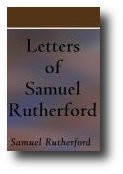 Loading... Please wait...
Loading... Please wait...- SWRB Home
-
Free Resources
- Short Listings Of Free Reformation & Creation Resources
- Free Reformed, Puritan, Covenanter and Creationist Videos
- Thousands of Links to Free Audio, Video and Printed Resources
- Free Puritan Books, Reformed MP3s, and Calvinist Videos
- Puritan Quotes, Free Reformation MP3s, Reformed Books and Calvinist Videos From PuritanDownloads.com On FaceBook
- Shipping & Returns
- Blog
- Privacy Policy
- Contact Us
- Payment Options
- Help
-
About Us
- Sitemap
Pastor Scott Brown, on the left in the video above, is the Director of the National Center for Family-Integrated Churches (NCFIC)
Resource Categories
- PURITAN HARD DRIVE REVIEWS
- PASTOR ROB VENTURA ON THE PURITAN HARD DRIVE
- DR. VODDIE BAUCHAM, JR. ON THE PURITAN HARD DRIVE
- R. C. SPROUL ON SWRB
- DR. JOEL R. BEEKE ON THE PURITAN HARD DRIVE
- PASTOR GREG L. PRICE ON THE PURITAN HARD DRIVE
- DR. MATTHEW MCMAHON ON THE PURITAN HARD DRIVE
- PASTOR SCOTT BROWN ON THE PURITAN HARD DRIVE
- PASTOR W. J. MENCAROW ON THE PURITAN HARD DRIVE
- JOAQUIN FERNANDEZ ON THE PURITAN HARD DRIVE
- PASTOR DAVID SILVERSIDES ON THE PURITAN HARD DRIVE
- JOHN HENDRYX ON THE PURITAN HARD DRIVE
- PASTOR KEVIN GUILLORY ON THE PURITAN HARD DRIVE
- RICHARD BENNETT ON THE PURITAN HARD DRIVE
- DR. KENNY RHODES ON THE PURITAN HARD DRIVE
- JUSTIN RAWSON ON THE PURITAN HARD DRIVE
- PASTOR JAMES WALLACE ON THE PURITAN HARD DRIVE
- PASTOR RICHARD GAGNON ON THE PURITAN HARD DRIVE
- PASTOR JOE HAYNES ON THE PURITAN HARD DRIVE
- DR. STEVEN DILDAY ON THE PURITAN HARD DRIVE
- PASTOR ANDREW COMPTON ON THE PURITAN HARD DRIVE
- TERENCE ELLARD ON THE PURITAN HARD DRIVE
- PASTOR JERRY JOHNSON ON THE PURITAN HARD DRIVE
- PASTOR DAVID PETRIE ON THE PURITAN HARD DRIVE
- JIM DODSON ON THE PURITAN HARD DRIVE
- PASTOR BRIAN SCHWERTLEY ON THE PURITAN HARD DRIVE
- PASTOR PHIL GIBSON ON THE PURITAN HARD DRIVE
- MEL R. EVERINGHAM II ON THE PURITAN HARD DRIVE
- PAUL BLYTH ON THE PURITAN HARD DRIVE
- STEVE KETTLER ON THE PURITAN HARD DRIVE
- D. M. (CALIFORNIA) ON THE PURITAN HARD DRIVE
- MICHAEL CAUGHRAN ON THE PURITAN HARD DRIVE
- WIILIAM NOPPER IV ON THE PURITAN HARD DRIVE
- LINDA THERIAULT ON THE PURITAN HARD DRIVE
- WILLIAM WARNOCK ON THE PURITAN HARD DRIVE
- ROBERT KOH ON THE PURITAN HARD DRIVE
- WHAT'S ON THE PURITAN HARD DRIVE?
- ALL PURITAN HARD DRIVE VIDEOS
- PHD-ODE INSTALLATION VIDEOS
- COMMENTS ON SWRB
- ALL PURITAN QUOTE VIDEOS
- PURITAN HARD DRIVE SCREENSHOTS
- PURITAN HARD DRIVE MINISTRY AND DONATION OFFERS
- TABLE OF RESOURCE CATEGORIES
- Advanced Studies
- SWRB SERMONAUDIO MOBILE APP
- Apologetics
- Assurance
- Attributes and Holiness of God
- Augustine
- Banner of Truth
- Baptism
- Beginners
- Bibles (Geneva, KJV, Hexapla, etc.)
- Biblical Counseling
- BIBLICAL HD COLLECTION
- Biblical Interpretation (Hermeneutics)
- Biographies and Autobiographies
- Calvinism and the Sovereignty of God
- CALVINISM HD COLLECTION
- CALVINIST CLASSICS HD COLLECTION
- Charles Spurgeon
- Children's Books
- CHRISTIAN EDUCATION HD COLLECTION
- Christian History
- Church Government
- Civil Government and Resistance
- CLASSIC CHRISTIAN HD COLLECTION
- Classic Puritan and Reformed Sets
- Commentaries
- Contemporary Issues
- Covenant Theology and Covenanting
- COVENANTER HD COLLECTION
- Covenanters and Covenanted Reformation
- Creation and Creationism
- Creeds, Confessions and Covenants
- Cults, False Religions, Psychology, Humanism
- Dealing with Affliction, Suffering, and Sickness
- Debates
- Dutch Reformed
- Education and Home Schooling
- English Puritans, Covenanters and Reformers
- Family, Children, Home, and Family Worship
- First Reformation
- Five Points of Calvinism (TULIP)
- For Pastors and Elders
- For Seminary Students
- FREE PURITAN & REFORMATION MP3 AUDIO SERMONS/BOOKS
- FREE PURITAN BOOKS, REFORMATION MP3s, PDFs, VIDEOs
- George Gillespie
- God's Law, The Ten Commandments, etc.
- Greg L. Price on Headcoverings
- Heaven, Hell and the Final Judgment
- Holy Days (Lord's Day, Christmas, Easter, etc.)
- HOME SCHOOL HD COLLECTION
- Intermediate Studies
- John Bunyan
- John Calvin
- John Knox
- John Owen
- Jonathan Edwards
- Justification
- Languages, Dictionaries, Reference, etc.
- LOOK WHO LOVES THE PURITAN HARD DRIVE
- Lord's Supper (Communion)
- Marriage, Courtship, etc.
- Martin Luther and Lutheranism
- Martyrs and Persecution
- Other Protestant Works
- Predestination and Providence
- PRESBYTERIAN HD COLLECTION
- Presbyterians and Presbyterianism
- Prophecy, Antichrist, and Eschatology
- PROTESTANT HD COLLECTION
- PSALM SINGING MP3s (COMPLETE SET)
- Psalters, Psalm Singing and Music
- Puritan Facts
- PURITAN FAST SERMONS (1640-1653) - 34 VOLS SET
- Puritan Fast Sermons 1640-1653
- Puritans and Puritanism
- PURITAN HARD DRIVE
- REFORMATION HD COLLECTION
- Reformation History
- Reformed and Puritan Classics
- Reformed Baptist
- REFORMED BAPTIST HD COLLECTION
- REFORMED HD COLLECTION
- REFORMED PRESBYTERIAN HD COLLECTION
- Reformed Presbytery, RPNA Protesters, etc.
- Reformed Theology
- Reformed Worship, The Regulative Principle, etc.
- Roman Catholicism, the Jesuits, Islam, etc.
- Salvation and Evangelism
- Samuel Rutherford
- Sanctification, Prayer and Holiness
- Scottish Covenanters
- Scottish Presbyterianism
- Scripture Song MP3s (Psalms and Bibles Verses)
- Second Reformation
- Separation, Unity, Uniformity, etc.
- Sermons and Sermon Collections
- Solemn League and Covenant
- Theology and Doctrine
- Third Reformation
- Thomas Watson
- Westminster Confession, Assembly and Divines
- Authors (All A to Z)
Phone Orders:
(780) 450-3730
To obtain free Reformation books, Puritan MP3s and Calvinistic videos, SWRB discount coupons, etc., add yourself to SWRB's Puritan and Reformed email list by using the form above.
Letters of Samuel Rutherford (Complete and Unabridged)
Resource Details
Resource Description
Spurgeon said, "What a wealth of spiritual ravishment we have here! Rutherford is beyond all praise of men. Like a strong-winged eagle he soars into the highest heaven and with unblenched eye he looks into the mystery of love divine."
Continuing, he comments, "let the world know that Spurgeon held Rutherford's Letters to be the nearest thing to inspiration which can be found in all the writings of men... none penetrated further into the innermost heart of holy fellowship with Jesus. Whenever we think of him we compare him to Milton's Uriel, the angel that stood in the sun itself."
Richard Baxter commented, "Hold off the Bible, such a book as Mr. Rutherford's Letters, the world never saw the like." And Cecil notes, "It is one of my classics. Were truth the beam, I have no doubt that if Homer, and Virgil, and Horace, and all that the world has agreed to idolize, were weighed against that book, they would be lighter than vanity. He is a real original" (Remains cited in Johnston's The Treasury of the Scottish Covenant).
Walker adds his voice to this chorus of praise calling these, "letters which, I may say, stand all alone in religious literature... So far as I know, they are the only letters two centuries old (i.e. when Walker wrote this--RB) which are still a practical reality in the religious life of Scotland, England, and America. And criticism cannot get rid of the fact that they continue to retain their hold of human hearts, -- that they have won a place for themselves besides such books as Augustine's Confessions or Thomas a Kempis." (Theologians..., p. 8).
John Howie, in Biographia Scoticana (or the Scots Worthies), writes, "In all his writings he breathes the true spirit of religion; but in his every way admirable Letters, he seems to have outdone himself, as well as everybody else. These, although jested on by the profane wits of this age, because of some homely and familiar expressions in them, it must be owned by all who have any relish for true piety, contain sublime flights of devotion, and must ravish and edify every sober, serious, and understanding reader... From Aberdeen he wrote many of his famous letters, from which it is evident that the consolation of the Holy Spirit did greatly abound with him in his sufferings. Yea, in one of these letters, he expresses it in the strongest terms, when he says, 'I never knew before, that His love was in such a measure. If He leave me, He leaves me in pain, and sick of love; and yet my sickness is my life and health. I have a fire within me; I defy all the devils in hell, and all the prelates in Scotland, to cast water on it.'"
The body of this publication is from the 1891 edition of S.R.'s Letters. It contains Andrew Bonar's sketch of Rutherford's life and biographical notices of his correspondence, as well as the full compliment of Rutherford's letters.
Furthermore, to make this the most complete edition of Rutherford's Letters ever published, we have added:
- Robert M'Ward's original (1664) "Preface To the Christian Reader," of 45 pages (taken from a 1783 edition of Rutherford's Letters, which is easier to read, being in more modern type).
- Rutherford's "Testimony to the Covenanted Work of Reformation, between 1638 and 1649."
- Rutherford's "Dying Words, containing several Advices to some Ministers and near Relations" -- which further corroborates the large body of other evidence (cf. George Gillespie's dying testimony at the end of his Works, volume 2, for example) testifying to those glorious truths (of covenanted faithfulness to Christ and separation from malignants) that were foremost in the minds of the most prominent Covenanters, even moments before they eternally entered the presence of their Almighty Father.
- A postscript from earlier editions of this work (thought to be written by M'Ward).
All the above sections, which we have added, have been left out of many former editions of Rutherford's Letters -- including the Banner of Truth hardcover that was in print a couple of years ago. This is the first time, to our knowledge, that these valuable additions (which were at various times published together with these letters) and the full edition of Ruthrford's Letters have all been gathered into one publication.
The importance of M'Ward's original preface can be seen when we consider who he was and the part he played in Rutherford's life and the Reformation of his day. M'Ward was a persecuted and exiled Protester (exiled for preaching, in 1661, "against the overturning of the Covenanted Reformation by Parliament," -- Dictionary of Scottish Church History & Theology, p. 538), who "collected and arranged the papers of his preceptor, Samuel Rutherford, and gave the world his (Rutherford's--RB) Letters."
The Dictionary of Scottish Church History and Theology (pp. 537-38) further notes that McWard "studied at St. Andrews where he was a favorite of Samuel Rutherford" and that "when Rutherford went to London as a Commissioner to the Westminster Assembly, McWard accompanied his as an amanuensis... was a zealous Protester... in 1661 he preached against an overturning of the Covenanted Reformation by Parliament, entering a protest in heaven that he desired to be free from the guilt thereof. He was imprisoned 'for sedition and treasonable preaching... he helped with the editing and publication of Rutherford's Examen Arminianismi (Utrecht, 1668)... wrote several tracts to encourage resistance to those whom he believed were usurpers of power in the Church of Scotland. He asserted that is was not, as then constituted, 'of the genus Church at all, -- that, by its mere physical force-raid on the real Church of Scotland, it has proved itself to be absolutely devoid of ecclesiastical rights.' ... such publications rendered McWard, with his close friend John Brown of Wamphray (who was also taught by Rutherford--RB), odious to the regime of Charles II, and diligent efforts were made to have him expelled from Holland... He continued zealous against the Indulgences, opposing the efforts of Robert Fleming, his successor, at conciliation (see Earnest Contendings for the Faith)... Wodrow characterized him as 'a person of great knowledge, zeal, learning, and remarkable ministerial abilities.'"
The original publication of Rutherford's Letters came just three years after Rutherford's death. M'Ward hoped to strengthen the hands of the persecuted Covenanters with the publication of his preface and the release of Rutherford's Letters. In his preface M'Ward sets forth the context (and theological genius) of not only S.R.'s letters, but also of the turbulent times that drew forth some of the greatest theological literature ever produced.
Among these works we find the Westminster Standards, the "Solemn League and Covenant" and a large body of other Presbyterian, Covenanter, and Puritan writings that have been handed down to posterity, from these very days. These men knew (as M'Ward demonstrates in his preface to Rutherford's Letters) that the covenanted cause of Christ would prosper, though it was suffering a great setback at this time.
Additionally, though these covenanted Presbyterians were blessed with towering and sanctified intellectual abilities, they were no ivy tower theologians; each, to a man (almost), were more than willing to suffer and/or die for the covenanted cause of Christ. M'Ward's preface is an invaluable aid to understanding these men and their times.
Furthermore, this is the only place that you can obtain a copy of this exceedingly rare and valuable piece of testimony to the covenanted Reformation, as our "Digital Download editions" are the first reprintings of this preface in many years.
Additionally, it is very interesting to note that when these letters were first published in 1664 (note the date, just shortly after the great ejection), the book was titled Joshua Redivivus (i.e. revived--RB) or Mr. Rutherford's Letters Divided into Two Parts. The First, Containing those Which were Written from Aberdeen, Where He was Confined by a Sentence of the High Commission, Drawn Forth Against Him, Partly on the Account of His Declining them, Partly Upon the Account of His Non-conformity. The Second, Containing, Some Which were Written from Anworth, Before He was by the Prelates Persecution Thrust from His Ministry; and Others Upon Diverse Occasions Afterward from St. Andrews, London, etc. Now Published, for the Use of All the People of God; But More Particularly, for Those Who Now Are, or Afterward May Be Put to Suffering for Christ and His Cause; By a Well Wisher (Robert M'Ward--RB) to the Work of the People of God.
These Scriptures followed the full title to further stress the point of this publication: "They shall put you out of the synagogues: yea, the time cometh, that whosoever killeth you will think that he doeth God service. And these things will they do unto you, because they have not known the Father, nor me" (John 16:2-3); and "And ye became followers of us, and of the Lord, having received the word in much affliction, with joy of the Holy Ghost: So that ye were ensamples to all that believe in Macedonia and Achaia" (1 Thes. 1:6-7).
These letters were put out by Covenanters, for Covenanters, in defense of the Covenanted Reformation -- to strengthen the hands of the suffering covenanted servants (and martyrs) of Christ. M'Ward, who was banished to Holland (where he co-ministered with John Brown of Wamphray), specifically notes in his preface that his purpose in publishing the first edition of Rutherford's Letters (1664) was to bring comfort and encouragement to those 2000 ministers recently ejected for faithfulness to the Solemn League and Covenant. This was to be accomplished by setting forth Rutherford's example of faithfulness, courage and zeal, as seen throughout these letters, under similar circumstances of suffering.
This book was also intended to minister to the myriads of faithful Covenanters who were at that time experiencing increasingly violent persecution and opposition. Moreover, as Andrew Bonar notes in his prefatory "Sketch of Samuel Rutherford" (included in this edition) These letters will ever be precious to:
- All who are sensible of their own, and the Church's decay and corruptions
- All who delight in the Surety's imputed righteousness
- All who rejoice in the Gospel of free grace
- All who seek to grow in holiness
- All afflicted persons
- All who love the Person of Christ
- All who love that blessed hope and the glorious appearing of the great God and Saviour
Another Rutherford masterpiece, not to be missed!
834 pages. Enjoy the feast!
All resources for sale on this website, with the exception of Scottish Metrical Psalms MP3s, are available on the Puritan Hard Drive .
VIDEO INTRODUCTION TO THE PURITAN HARD DRIVE


Find Similar Resources by Category
Phone Orders:
(780) 450-3730
To obtain free Reformation books, Puritan MP3s and Calvinistic videos, SWRB discount coupons, etc., add yourself to SWRB's Puritan and Reformed email list by using the form above.








































